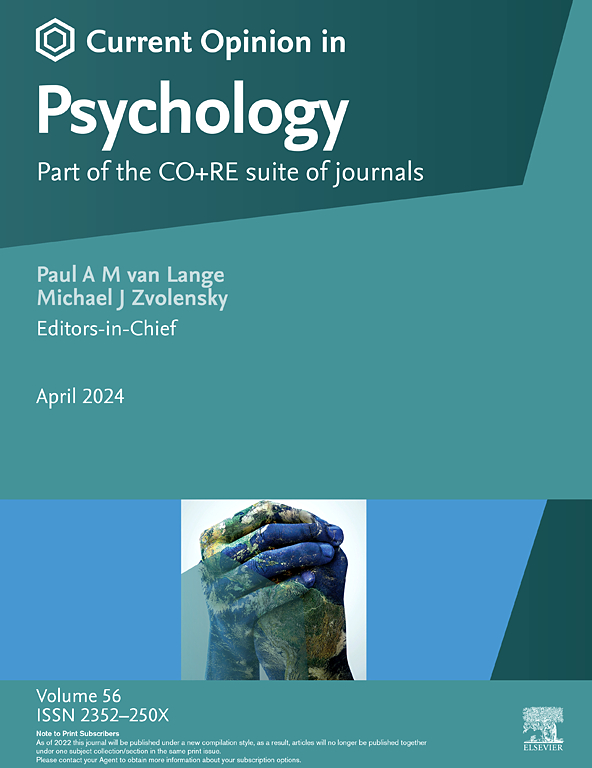整合社会学习和网络形成,促进社会向可持续未来倾斜
IF 6.3
2区 心理学
Q1 PSYCHOLOGY, MULTIDISCIPLINARY
引用次数: 0
摘要
许多心理偏差决定了我们在观察他人遵守或偏离社会规范时的反应。根据我们的社交网络,我们可能会更多地受到社会主流的影响,比如肉类消费的普及或频繁的航空旅行,或者受到我们最亲密朋友的可持续生活方式的影响。社会规范的演变受个人偏好、价值观、信仰和社会网络结构的影响。了解这些动态变化对于促进可持续文化转变至关重要,但我们对规范转变如何发生的了解仍然有限。在本文中,我们模拟了一个基于代理的模型,在该模型中,代理在维持现状或采取替代方案之间做出选择,并进行协调博弈。我们的模型说明,如果人口的结构是两极分化的网络,那么旨在改变个人偏好的干预措施可能会失败,在这种网络中,具有相似偏好的代理人聚集在一起,并主要在其群体内互动。这些回音室限制了基于偏好的干预措施的有效性。然而,我们的研究表明,如果采取后续干预措施,提高具有不同偏好的行为主体的行为的显著性,就能成功地将人口从现状均衡转向替代规范均衡。本文概述了政策制定者在设计干预措施以促进积极的社会规范变化时所面临的挑战。我们主张重新评估当前规范变化的建模和实证研究方法。我们对未来研究的主要建议是更全面地纳入个人对社会信息和网络形成的各种反应方式。本文章由计算机程序翻译,如有差异,请以英文原文为准。
Integrating social learning and network formation for social tipping towards a sustainable future
Numerous psychological biases shape how we respond to observing others conforming to or diverging from social norms. Depending on our social networks, we may be more influenced by societal majorities, such as the widespread consumption of meat or frequent air travel, or by the sustainable lifestyles of our closest friends. The evolution of social norms is shaped by personal preferences, values, beliefs, and the structure of social networks. Understanding these dynamics is crucial for promoting a cultural shift towards sustainability, yet our grasp of how normative transformations occur remains limited. In this paper, we simulate an agent-based model in which agents choose between maintaining the status quo or adopting an alternative, engaging in a coordination game. Our model illustrates that interventions aimed at changing individual preferences may fail if the population is structured in polarised networks, where agents with similar preferences cluster together and primarily interact within their groups. These echo chambers limit the effectiveness of preference-based interventions. However, we show that a subsequent intervention that increases the salience of behaviours from agents with dissimilar preferences can successfully tip the population from a status quo equilibrium to an alternative norm equilibrium. This paper outlines the challenges policymakers face in designing interventions for catalysing positive social norm changes. We argue for a reevaluation of current methodologies for modelling and empirically investigating norm change. Our primary recommendation for future research is a more comprehensive incorporation of the myriad ways individuals respond to social information and network formation.
求助全文
通过发布文献求助,成功后即可免费获取论文全文。
去求助
来源期刊

Current Opinion in Psychology
PSYCHOLOGY, MULTIDISCIPLINARY-
CiteScore
12.10
自引率
3.40%
发文量
293
审稿时长
53 days
期刊介绍:
Current Opinion in Psychology is part of the Current Opinion and Research (CO+RE) suite of journals and is a companion to the primary research, open access journal, Current Research in Ecological and Social Psychology. CO+RE journals leverage the Current Opinion legacy of editorial excellence, high-impact, and global reach to ensure they are a widely-read resource that is integral to scientists' workflows.
Current Opinion in Psychology is divided into themed sections, some of which may be reviewed on an annual basis if appropriate. The amount of space devoted to each section is related to its importance. The topics covered will include:
* Biological psychology
* Clinical psychology
* Cognitive psychology
* Community psychology
* Comparative psychology
* Developmental psychology
* Educational psychology
* Environmental psychology
* Evolutionary psychology
* Health psychology
* Neuropsychology
* Personality psychology
* Social psychology
 求助内容:
求助内容: 应助结果提醒方式:
应助结果提醒方式:


